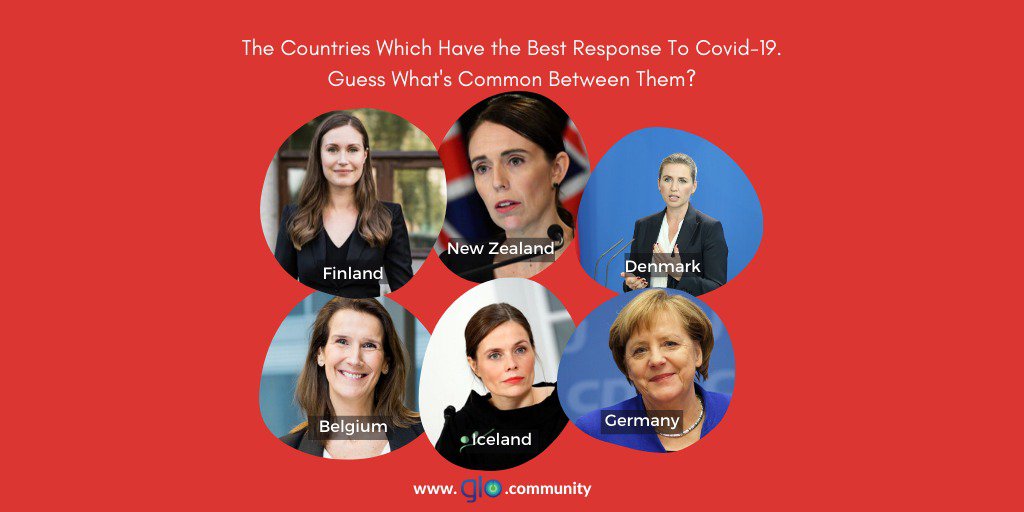6 Countries That Witnessed Flattening Of The Coronavirus Curve: All Women-Led
3 minuteRead

The coronavirus pandemic has had a grip across the world and the countries efficiently handling the situation to flatten the curve of the COVID-19 spread all have one thing in common: they are all led by women!
It is said that women are better at handling crises. And these women leaders of all the below-mentioned countries are the strongest examples. Some facts to think about:
Germany
Headed by Angela Merkel, Germany seems to be beating the coronavirus curve with a ratio of 95% recoveries of the total closed cases.
Merkel urged her people to practice social-distancing as early as the first week of March. Germany is approx. testing 500,000 people per week, a number far more than any other European country and is also boosting the supply of ICU beds and ventilators.
A New York Times article mentioned how Merkel addressing the press "was a reminder of the woman who for much of the past 14 years has been the rock in European politics. She is the leader who reassured savings account holders during the financial crisis; who held the euro area together in the sovereign debt crisis; and who was celebrated, at least in many quarters, as the defender of liberal values after she decided to welcome over 1 million migrants in 2015."
New Zealand
Led by Prime Minister Jacinda Ardern, New Zealand has also seen a significant drop in the number of cases reported. A headline from the Washington Post goes something like this “New Zealand isn’t just flattening the curve. It’s squashing it.”- and this explains a lot.
Jacinda Ardern’s policies relied on a single powerful statement: “Act like you have coronavirus” - to convey to the nation, the importance of staying home. She told them that “Every move you then make is a risk to someone else. That is how we must all collectively think. That’s why the joy of physically visiting other family, children, grandchildren, friends, neighbors is on hold” that brought in a powerful perspective on how the virus must be dealt with.
New Zealand was one of the very first countries to force arriving travelers into self-isolation and to ban large gatherings which contributed immensely to curb the spread of the virus.
Belgium
Although the number of cases hasn’t slowed down in Belgium, their death rate has significantly reduced to 50% and they currently have a recovery rate of 67% in closed cases. Headed by Prime Minister Sophie Wilmès, there was strict lockdown enforced as soon as the death toll reached 10 which led to stopping the spread of the virus on time, if not early.
"Citizens are asked to stay at home to avoid most contacts, except for going to the doctor, to shop for food, the post office, a bank, pharmacy, petrol station or to help someone in need," she said. She also issued a warning, "Businesses could be fined if they break the new rules, and foreign travel that is not "indispensable" is banned until at least April 5."
Finland
With similar precautionary actions imposed in Finland, headed by Prime Minister Sanna Marin, the daily death rate has dropped since April 6th. Out of 300 closed cases, it has seen a recovery rate of 88%. The government has even banned public meetings of more than 10 people and imposed the complete closure of public services until the 13th of May to fight the novel coronavirus spread.
Iceland
In Iceland, the efforts of Katrin Jakobsdottir have seen a solid 99% recovery rate with 688 recoveries out of 694 closed cases and have also successfully managed to flatten the curve considering there has been a drop in the number of daily cases in April 2nd - a number that ought to be commendable by all other nations. The country has also introduced emergency measures worth 8% of the GDP to combat the impact of coronavirus.
Denmark
Even Denmark, headed by Prime Minister Mette Frederiksen has flattened the curve of COVID-19 spread and recorded a drop in the number of cases (from 390 to 233 on 9th April). They aim to gradually relax the lockdown by opening up daycares and schools initially instead of all services at once.
Denmark's response to the COVID-19 pandemic was applauded worldwide as a supreme example, especially due to its numerous economic measures.
6 women representing 6 different nations to fight the same cause. And all seemed to have succeeded. We guess it’s true what Michelle Obama quoted in a speech once, not so long ago: “There is no limit to what we, as women, can accomplish.”
Write, Record and Answer! Consume Unlimited Content! All you need to do is sign in and its absolutely free!
Continue with one click!!By signing up, you agree to our Terms and Conditions and Privacy Policy.










